
Dneprovsky Railway Switch Plant JSC (DnSZ, Dnipro) will pay dividends to shareholders totaling UAH 420 million from its net profit of UAH 540.4 million between April 22 and October 1 this year.
According to a statement in the information disclosure system of the National Securities and Stock Market Commission (NSSMC), the decision was made by the general meeting of shareholders on March 26. Dividends will be paid at the rate of UAH 1.65 thousand per ordinary share of UAH 10.5.
As reported, based on the results of its operations in 2023, SESP paid UAH 112 million in dividends to shareholders (out of the net profit of UAH 510.86 million) at the rate of UAH 440 per share of UAH 10.5.
As of the end of 2024, 20.154% of the shares of DnSZ JSC are owned by Johnen Capital Limited (Cyprus), 5% are owned by Dnipro City Council member Zahid Krasnov, his sons Ruslan and Artem own 10% and 11.228% of the shares, respectively, and another 18.2959% are owned by Israeli citizen Victoria Korban (sister of businessman Gennadiy Korban – IF-U).
Among the shareholders who own more than 5% of the shares of DnSZ JSC are also the chairman of the board Sergiy Taranenko (almost 10%), Iryna Taranenko (8.658%), and CFO Valeriy Kryachko (7.3%).
DnSZ specializes in the production of track superstructure elements: switches, blind crossings of various brands, and leveling devices. The products are sold mainly in Ukraine and exported to more than eight countries.
As reported, in 2024, the plant increased its consolidated net income by 29.3% compared to 2023, to UAH 2 billion 380 million.
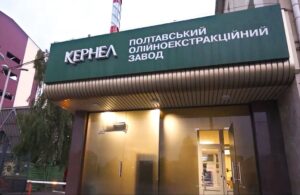
In 2024, Poltava Oil Extraction Plant, a part of Kernel Agricultural Holding, posted a net loss of UAH 61.06 million compared to UAH 27.06 million in net profit a year earlier.
According to the agenda of the annual general meeting of shareholders scheduled for April 18 in remote mode, the shareholders are proposed to approve the results of financial and economic activities, the loss of UAH 61.06 million to be covered in full at the expense of retained earnings of future years.
The shareholders are to hear and approve the report of the company’s board of directors and take into account the recommendations of the audit company Forum LLC in their further work. They will also review a number of contracts with raw material suppliers, which are used to produce and bottle the oil and produce meal.
In addition, the shareholders will give their consent to enter into significant transactions with a maximum aggregate value of $5 billion during the year, subject to prior approval by the company’s board of directors.
The general meeting will approve a new version of the company’s charter, which will be subject to state registration of amendments in accordance with the requirements of the current legislation.
According to the Opendatabot service, in 2024, Poltava Oil Extraction Plant PJSC increased its revenue by 12.3% to UAH 1.436 billion, debt obligations by 13.1% to UAH 900.5 million, and reduced assets by 2.7% to UAH 1.456 million. The number of employees increased by 28 people to 573 during the year.
PJSC Poltava Oil Extraction Plant is a crude and refined sunflower oil production company founded in 1991. It is part of the Kernel agricultural holding. The processing capacity is 429 thousand tons of sunflower seeds per year (1.3 thousand tons per day). The mill uses tolling raw materials. It has 6 silos for short-term storage with a capacity of 15 thousand tons, as well as equipment for cleaning and drying grain.
The company produces unrefined, refined and hydrated vegetable oils, which it sells under the Shchedryi Dar, Liubonka and Chumak brands. Finished products are exported to Cyprus, Greece, Israel, Italy, Lithuania, and Saudi Arabia.
The beneficiary of the plant is Andriy Verevsky through Kernel-Capital LLC (99.63%).
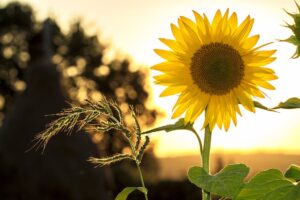
TAS Agro’s southern cluster (Kirovohrad, Vinnytsia and Mykolaiv regions) has started the spring sowing campaign, with a focus on sunflower, which will be planted on 2764 hectares, the company’s press service reported on Facebook.
“The production units are fully provided with seeds, fertilizers, plant protection products, and fuel and lubricants. Modern technological complexes are used in sowing, which increase the accuracy of sowing and increase productivity,” said Andriy Zvarych, director of TAS Agro South LLC.
Meanwhile, preparations for the sowing season are underway in the central, northern and western clusters of TAS Agro. In particular, TAS Agro’s northern cluster in Chernihiv region is currently preparing machinery for the upcoming spring field work. TAS Agro West is completing the pre-sowing soil preparation stage, which involves closing off moisture on an area of 13.5 thousand hectares.
In addition, TAS Agro Center continues to provide comprehensive crop care and conducts regular fertilization of winter wheat using UAN-32 mixed with ammonium thiosulfate.
TAS Agro was established in 2014. Its land bank includes 88 thousand hectares in Chernihiv, Sumy, Kyiv, Vinnytsia, Kirovohrad and Mykolaiv regions. The holding specializes in crop production, with elevators with a capacity of about 250 thousand tons. The livestock business is represented by a cattle herd of 5.5 thousand heads, of which 2.5 thousand heads are dairy cattle.
According to the Opendatabot resource, the company’s revenue in 2023 amounted to UAH 2.588 billion, net profit – UAH 155.842 million, debt – UAH 1.2 billion, assets were estimated at UAH 1.8653 billion, and the number of employees – 129. The authorized capital is UAH 8 thousand.
The agricultural holding is part of the TAS group, founded in 1998. Its business interests include the financial sector (banking and insurance segments) and pharmacy, as well as industry, real estate, and venture capital projects.
The founder of TAS and the beneficiary of the TAS Agro agricultural holding is Sergiy Tigipko.
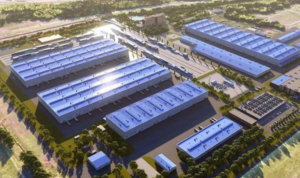
On Thursday, April 10, 2025, from 9:30 to 19:00, the second Eco-Industrial Parks Forum will take place in Kyiv, bringing together leading government officials, business and experts to discuss key strategies and solutions for implementing circular sustainable economy models in the context of Ukraine’s post-war recovery.
The high-level event will be held within the framework of the United Nations Industrial Development Organization (UNIDO) project “Global Eco-Industrial Parks Program II – Ukraine: National Component”, which is being implemented with the support of the Government of Switzerland through the Swiss State Secretariat for Economic Affairs (SECO) in cooperation with the Ministry of Economy of Ukraine.
The forum aims to join forces to accelerate the development of eco-industrial parks in Ukraine, which will become the driving force of the new generation economy, combining industrial development with the principles of a green economy.
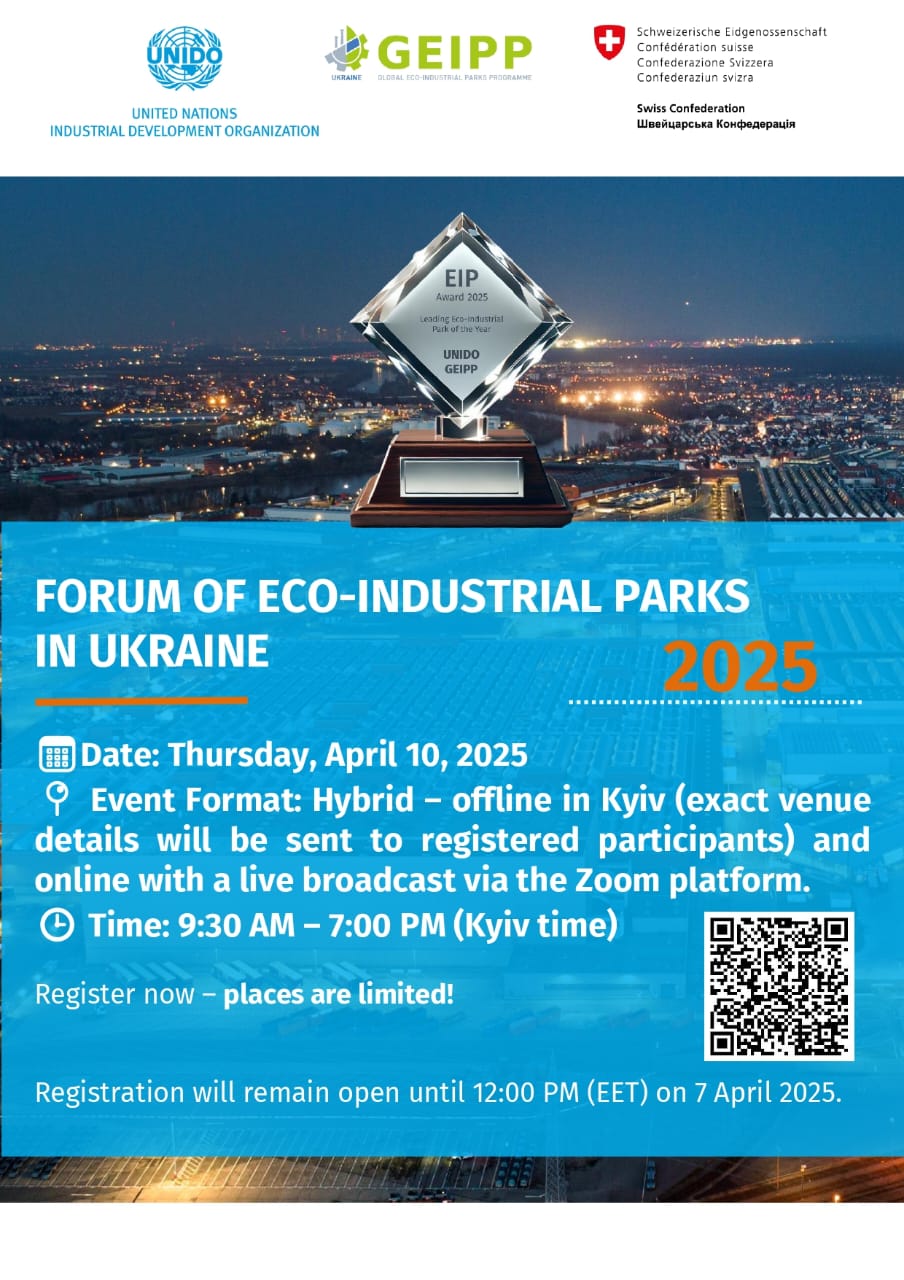
The key topics of the forum will include:
Representatives of the Government of Ukraine, the Verkhovna Rada of Ukraine, the Embassy of Switzerland, UNIDO and other international organizations, as well as more than 30 leading international and Ukrainian experts and business community leaders will take part in the opening ceremony and discussion panels.
“The rebuilding of Ukraine is a chance to create a new generation economy integrated into the European economic space. Eco-industrial parks can become its driving force, combining industrial development with the principles of the circular economy. However, success depends on the right choice of models and policies, and this is a common challenge for government and business. Only joint efforts will contribute to the creation of industrial ecosystems that will become engines of sustainable growth,” said UNIDO’s Industrial Development Coordinator Christian Susan.
The forum will provide an opportunity to network with key stakeholders who shape the future of sustainable industrial development in Ukraine. The forum will also feature an award ceremony for the most successful eco-industrial parks in Ukraine 2025.
To register for the forum as a media representative, please follow the link: https://forms.gle/WS6Hhks5Gm1qyaDfA
To register as a forum participant: bit.ly/4c3kIsw
Registration is open until 12:00 on April 7, 2024. Upon completion of the registration, registered media representatives will receive a confirmation of registration with the location of the forum and details of the form.
For more information, please contact: office@conferexpo.com or call +380976844142
For reference:
The GEIPP Ukraine project is part of the Global Eco-Industrial Parks Program (GEIPP), which is implemented by UNIDO in seven countries and funded by the Government of Switzerland through the State Secretariat for Economic Affairs (SECO). The main beneficiary of the project is the Ministry of Economy of Ukraine. The project started in 2020.
The main goal of the project is to demonstrate the viability and benefits of eco-industrial park (EIP) model approaches to increase resource productivity and improve economic, environmental, and social performance of businesses, thus contributing to inclusive and sustainable industrial development in Ukraine.
More about the project can be found here: https://geipp-ukraine.org/
Interfax-Ukraine is a media partner
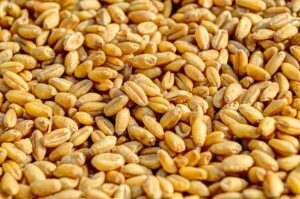
In March, Ukraine exported 1.1 million tons of wheat, which is one of the highest monthly figures of the current season, in April, the volume of supplies may be slightly lower, but still remain at a high level, according to the analytical cooperative “Start”, created within the framework of the All-Ukrainian Agrarian Council.
“For April, 850 thousand tons of wheat have already been contracted, and the total monthly exports may reach 1 million tons. Despite the general stagnation of demand in the European market, Ukrainian grain is finding its buyers, particularly in Egypt,” analysts said.
However, according to experts, the situation is less optimistic from the price point of view. The main export destinations for Ukrainian wheat – Italy, Spain, and the Netherlands – remain passive in terms of new purchases, and the reintroduction of duties on Ukrainian grain to the EU in June may further complicate access to the European market.
“There is no positive news for the wheat price so far. The stock market has been sinking in recent weeks, and we see a serious gap between the physical market and stock exchange quotes. While the FOB price in Ukraine is currently $60 per ton higher than in Chicago, by June-July the markets usually synchronize. This means that the Ukrainian physical price may sink, especially as the new harvest approaches,” Pusk commented.
According to analysts, the conditional average price for wheat of the 2nd class of the new harvest for July is forecasted at $190-200 per ton on a CPT-port basis, while currently this figure is fixed at $210-215. The potential decline could be up to $20 per ton.
“If you have the opportunity, you should not rush to sell. Historically, in July-August, the market is saturated with wheat from all major exporting countries – Ukraine, Russia, Romania, and the US – and even with a deficit balance, the price usually falls. At the same time, the seasonal model shows that from October to December, the price may rise to $220-235 per ton on a CPT-port basis. Therefore, if the financial cushion allows, it is worth considering postponing sales,” the analysts added.
They stated that flour mills are currently offering the best prices on the domestic market – 10500-11000 UAH/ton for 2-3 grade wheat.
“Given the sluggish export demand, this may be a more profitable solution for farmers,” Pusk believes.

The Chinese company SHAC will invest 40 million euros in the construction of a plant in Novi Sad, Serbia. The company has already signed an agreement with the German automaker BMW. The plant is expected to open by the end of 2025, with the first serial deliveries to European customers scheduled for the first quarter of 2027.
Other Chinese investment projects in Serbia:
Energy sector: In May 2024, the Serbian Ministry of Mines and Energy signed two agreements with Chinese companies totaling about €2.7 billion. These investments include the construction of an oil and petroleum product refinery in Smederevo and the construction of a solar panel plant in Paracin.
Infrastructure: The Chinese company Shandong High-speed Group is involved in the construction of the Belgrade-Zrenjanin-Novi Sad highway, as well as in the reconstruction project of the Constantine the Great airport in Niš.
Automotive industry: Mei Ta has invested 60 million euros in the construction of a plant for the production of automotive components in Obrenovac.
These projects demonstrate the expansion of Chinese investment in various sectors of the Serbian economy, contributing to industrial development and job creation in the region.
Source: https://t.me/relocationrs/741